Are You Using a Fake Vape? Here’s How to Tell
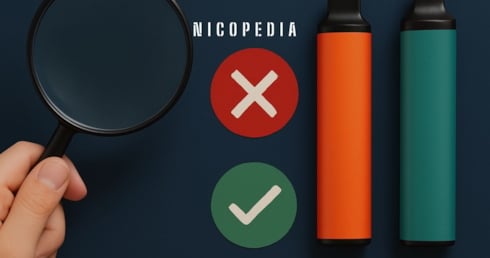
With fake vapes flooding UK shelves and new regulations on the horizon, knowing how to spot a counterfeit has never been more important. This guide will help you identify the warning signs, understand the risks, and make sure you are getting authentic vape products.
Key Takeaways
- Fake vapes are increasingly widespread in the UK, especially imitating brands like Elf Bar and Lost Mary.
- These products can pose risks due to poor-quality batteries, unregulated ingredients, and excessive nicotine levels.
- Often sold at unreasonably low prices, fake vapes usually bypass MHRA compliance and packaging standards.
- Key signs include missing QR codes, lack of MHRA registration, poor packaging, and inconsistent labelling.
- To avoid counterfeit products, purchase from reputable retailers such as Haypp, which stocks MHRA-notified and compliance-checked items.
Why This Matters: The Rise of Counterfeit Vapes in the UK
As the UK prepares for the ban on disposable vapes set to begin on 1st June 2025, the presence of counterfeit and non-compliant vaping products has surged. Reports from Trading Standards and the BBC highlight a worrying trend: more than 1.19 million illegal vapes were confiscated between 2023 and 2024, and hundreds of retailers across the country faced enforcement actions. The number of seizures by Trading standards has increased by 59%, with 299,224 vapes being confiscated between October and December 2023 alone.
Popular brands such as Elf Bar, Lost Mary, and Geek Bar are among the most frequently counterfeited, making it increasingly difficult for consumers to distinguish genuine products from fake ones. These unauthorised items may include untested e-liquid formulations, dangerously high nicotine concentrations, and unreliable hardware. Identifying a fake vape has never been more crucial.
What is a Fake Vape?
In simple terms, a fake vape is a device or e-liquid that imitates a legitimate brand but hasn’t been manufactured or approved by them. These products usually bypass regulatory checks, such as registration with the Medicines and Healthcare products Regulatory Agency (MHRA) and may be sold without proper labelling or safety documentation. Often these vapes are imported illegally, without any quality assurance, meaning users can’t be sure what’s inside them.
How Common Are Fake Vapes in the UK?
Counterfeit vape products are widespread. In recent years, Trading Standards has identified that some UK cities report one in three shops selling non-compliant devices. In several raids, thousands of products were found with nicotine strengths far above the UK legal limit of 20mg/ml. There have also been cases of retailers being fined, ordered to close, or prosecuted for selling to underage customers or distributing illegal devices.
These products are frequently sold in markets, independent convenience stores, and increasingly, through online sellers and social media platforms. If a product is priced far below its usual retail cost or lacks proper packaging, it's worth questioning its legitimacy.
Why Fake Vapes Pose Real Problems
From a legal standpoint, selling or distributing counterfeit vapes is a criminal offence. But even as a consumer, there are serious implications. These unregulated devices may contain substances that haven't undergone any safety testing, including illicit or mislabelled e-liquids. In some instances, the batteries used are of such poor quality that they've been linked to overheating incidents or malfunctions.
Additionally, because fake vapes often mimic the look of popular products, users may unknowingly expose themselves to entirely different ingredients than expected. Without transparency and regulation, there's no way of knowing what you're inhaling.
Identifying a Counterfeit Vape: What to Check
Spotting a fake vape involves close attention to detail. A genuine product will typically have a clearly printed box with no spelling mistakes, a scratch code or QR code that links to the manufacturer’s verification site, and will comply with MHRA regulations, including limits on e-liquid volume and nicotine strength.
Below is a comparison table outlining key differences:
| Feature | Authentic Vape | Counterfeit Vape |
| MHRA ECID Listing or Scratch Code / QR Code | Yes, verifiable via MHRA portal or Unique code verified on brand website | Missing or not listed on the MHRA or Fake, reused code, or not scannable |
| Packaging | Clear fonts, seals and no errors | Typos, odd colours and missing warnings |
| E Liquid Volume/Nicotine Content | Within UK legal limit (2ml/20mg) | May exceed legal limits |
| Price | Market value £5-£7 per unit | Typically priced under £3 — a potential indicator of a counterfeit product |
| Retailer | Haypp, supermarkets, trusted stores | Unknown websites, market stalls, certain corner shops |
Fake Vapes by Category
Disposable Vapes
Products like Elf Bar and Lost Mary are widely counterfeited. These fakes often arrive without a verification label or with one that doesn't match what’s on the manufacturer’s website. They may contain more than the legal limit of 2ml e-liquid, resulting in over 600 puffs, and have poor build quality, including leaking or flavours not listed on official packaging. Missing recycling and safety information are also common indicators of a fake.
Refillable Devices and Pods
With refillable vape kits and pod systems, counterfeit products are harder to spot visually but can often be identified by poor fit and finish. Cartridges that don't seal properly or have inconsistent airflow may be knockoffs. Always ensure that any replacement pod or coil is sourced from a trusted retailer. You can browse genuine vaping devices directly from Haypp.
E-Liquids
E-liquid authenticity is especially important because it relates directly to what you're inhaling. A legal e-liquid should have a batch number, nicotine strength, manufacturer details, and appropriate warnings on the label. If a bottle is missing these details or seems oddly cheap, it’s best avoided. E-liquids sold at Haypp are all MHRA-notified and properly labelled, so you're never left guessing.
How to Check if Your Vape Is Real
The most reliable method to verify a vape’s authenticity is to cross-check its details using the MHRA ECID database. You can search for product names or ECID codes using the MHRA's electronic cigarette notification portal.
Many brands, including Elf Bar, also provide online verification tools. Most boxes come with a scratch code or QR code; once revealed, you can enter it on the brand’s website to confirm legitimacy. If the code has been checked multiple times or returns an error, the product is likely a fake.
Careful inspection of packaging helps too. Are the colours crisp and fonts clear? Does it include all necessary safety labels, CE marks and recycling info? If anything looks off, you're right to question it.
Buying from a reputable seller is one of the most reliable ways to reduce your risk of purchasing a counterfeit vape. Haypp offers a carefully curated range of UK-compliant products, which you can view in our vape collection.
How to Check If Your Vape Is Real: Brand-by-Brand Guide
With counterfeit vapes becoming increasingly sophisticated, it's crucial to verify the authenticity of your device to ensure safety and optimal performance. Below is a comprehensive guide on how to authenticate products from leading vape brands:
Elf Bar
Elf Bar employs advanced anti-counterfeiting measures to help consumers verify their products:
- Authentication Label: Each Elf Bar product features a security label with a QR code and a scratch-off area revealing a unique verification code.
- Verification Process:
- Locate the authentication label on your product.
- Scratch off the protective layer to reveal the security code.
- Visit the Elf Bar Verification Page.
- Enter the code or scan the QR code to confirm authenticity.
For more details, refer to Elf Bar's verification instructions.
Lost Mary
Lost Mary provides a straightforward method to verify their products:
- Security Features: Products come with an 18-digit security code and a QR code on the packaging.
- Verification Steps:
- Locate the security code or QR code on your product.
- Visit the Lost Mary Verification Page.
- Enter the 18-digit code or scan the QR code to verify authenticity.
For additional support, you can contact Lost Mary at support@lostmary.com.
VAPORESSO
VAPORESSO has implemented a multi-layered anti-counterfeiting system:
- Verification Labels: Depending on the product version, labels may include holographic features that change under light and a scratch-off area revealing a 14-digit security code.
- Verification Process:
- Identify the anti-counterfeit label on your product.
- Scratch off the protective layer to reveal the security code.
- Visit the VAPORESSO Product Authentication Page.
- Enter the 14-digit code to verify your product.
For more information, check out VAPORESSO's authentication guide.
OXVA
OXVA offers two methods to authenticate their products:
- Method 1: Scratch off the protective layer below the pattern to reveal a code; under different lighting, the anti-counterfeit logo displays the letters "O" and "X".
- Method 2: Scratch off the protective layer below the QR code and either scan it or enter the code manually.
- Verification Steps:
- Locate the authentication sticker on your product.
- Choose either method to reveal the code.
- Visit the OXVA Verification Page.
- Enter the code or scan the QR code to confirm authenticity.
For detailed instructions, refer to OXVA's verification page.
SKE
SKE is best known for its Crystal Bar disposable vape range, which has also become a target for counterfeiting. To help customers identify genuine products, SKE offers an official verification system.
- Locate the scratch-off area on the packaging. Every genuine SKE vape comes with a 14-digit verification code printed beneath a scratch panel—usually on the side or bottom of the box.
- Go to the official verification site. Visit the official SKE product verification page.
- Enter the 14-digit code. Type the verification code into the field provided. If your product is authentic, the website will confirm it. If the code is invalid or has been checked too many times, the product may be counterfeit.
- Check the packaging quality. Like other brands, SKE uses high-quality packaging. Warning signs of a fake include blurred printing, poor-quality materials, missing safety warnings, or inconsistencies in logos and labelling.
- Verify through trusted retailers. To minimise the risk of counterfeit purchases, buy your SKE Crystal Bar from trusted retailers only. SKE maintains a distribution list and authorised channels on its website.
Choosing an Alternative as the Ban Approaches
With the disposable vape ban fast approaching, many UK users are starting to explore long-term alternatives to disposable vapes. One popular option is tobacco-free nicotine pouches. Unlike vapes, these products don't contain e-liquid, require no batteries, and aren't impacted by the upcoming regulation changes.
Nicotine pouches are simple to use, and legal for adult nicotine usage. If you're considering a switch, Haypp's nicotine pouch range is a great place to start exploring.
How to Spot New Legal Pod Kits vs. Old Disposables
With tighter regulations now in place across the UK vape market, many popular disposables—like the Elf Bar 600 and Lost Mary BM600—have been phased out in favour of new, compliant pod kits. But at a glance, they can still look remarkably similar. Here’s three different ways you can spot the difference between legal pod kits and illegal old-style disposables:
1. Packaging & Labelling Clues
- E-liquid Volume & Strength: Legal products are capped at 2 ml e-liquid per pod and 20 mg/ml nicotine (max under UK law). If the packaging lists more, it’s a red flag.
- Look for ‘Pod Kit’ or ‘Rechargeable’: Modern compliant kits like the Elf Bar 600 Pod Kit and Lost Mary BM600 Pod Kit are clearly marketed as prefilled pod systems—unlike their disposable predecessors.
- Charging Port Present: A key giveaway—legal pod kits include a charging port, usually discreetly placed at the base of the device. Old disposables didn’t need one, since they were thrown away after a single use.
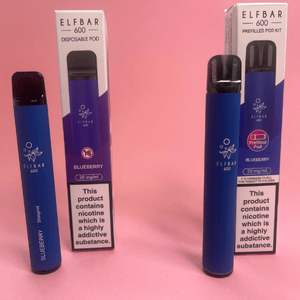
2. Device Design & Functionality
- Disposable vs. Rechargeable: Banned devices like the Elf Bar 600 were sealed and single-use. Legal pod kits are reusable, powered by an internal battery that can be recharged.
- Swappable Pods: Instead of disposing of the whole device after each use, pod kits come with click-in, prefilled pods that you can simply replace when empty. This modular design is a major visual (and functional) clue.
- Battery Indicators & Buttons: Some newer kits include LED lights to indicate battery level or pod connection—features not found on original disposables.
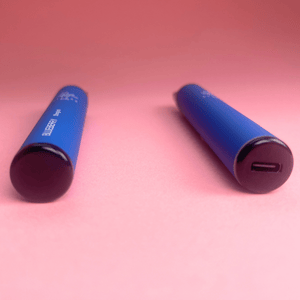
3. Specs: Puff Count & Liquid Capacity
- 2 ml / ~600 puffs: Even though they look like the older versions, legal pod kits stick to the same 2 ml/600 puff rule—but with a refill system.
- Watch for overinflated puff claims: Devices promising 1,500+ puffs often mean larger, non-compliant e-liquid volumes (and are likely illegal).
- Model Name Variations: Subtle name changes matter. The Lost Mary BM6000 Pod Kit is legal and rechargeable, while the BM600 Disposable is now banned.
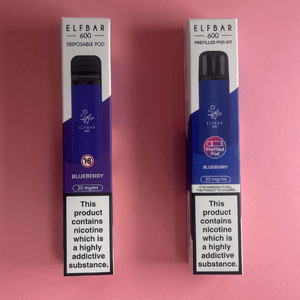
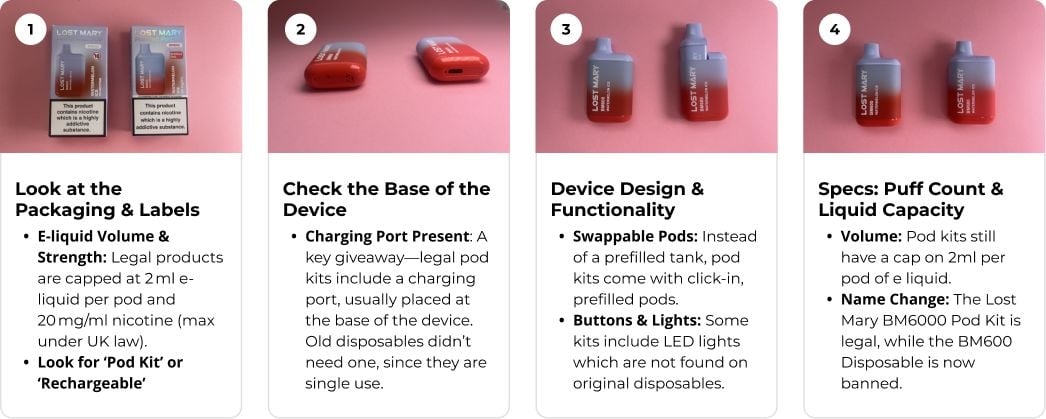
Quick Comparison Guide
|
Product |
Legal To Be Sold UK? |
Key Differences |
|
Elf Bar 600 (disposable) |
❌ No |
No charging port, single-use, often >2 ml |
|
Elf Bar 600 Pod Kit |
✅ Yes |
Rechargeable, 2 ml pods, labelled as “Pod Kit” |
|
Lost Mary BM600 (disposable) |
❌ No |
Sealed unit, disposable, no pod or port |
|
Lost Mary BM600 Pod Kit |
✅ Yes |
Rechargeable battery, swappable pods, port at base |
Final Tip
If your vape has a charging port and changeable pods, it’s likely a legal, reusable pod kit. If it’s sealed, non-rechargeable, and advertises big puff numbers, it’s almost certainly one of the now-illegal disposables. When in doubt, stick to reputable UK retailers who stock only TPD-compliant devices.
Fake Vape FAQ
Are Fake Vapes Dangerous?
Yes, fake vapes can be dangerous. Counterfeit vapes are not quality-checked and may include substances or components that are unsafe. Faulty batteries, excessive nicotine levels, and unknown ingredients are all potential risks.
Is it Illegal to Buy a Fake Vape?
While the legal burden lies mainly on sellers and distributors, buying counterfeit goods still exposes you to unregulated products, which can compromise your safety.
How Do I Know if my Vape is Registered with MHRA?
You can visit the MHRA website and search for your device or e-liquid using its name or ECID code. If it's not listed, it hasn’t been approved.
Are All Cheap Vapes Fake?
Not necessarily, but very low prices should raise suspicion. If the price is significantly lower than what’s shown on manufacturer sites or trusted retailers like Haypp, proceed with caution.
